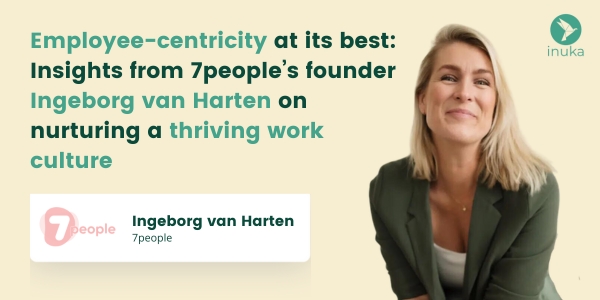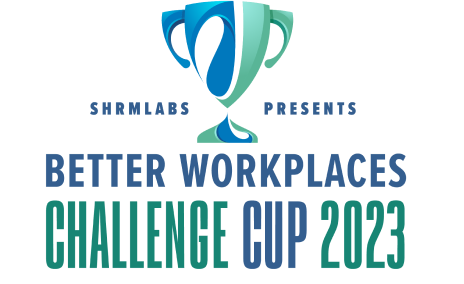Employee-centricity at its best: Insights from 7people’s founder Ingeborg van Harten on nurturing a thriving work culture

Ingeborg van Harten, founder of 7people, emphasises the paramount importance of employee-centricity, advocating for proactive well-being measures and a flexible, inclusive work culture to drive organisational success.
Ingeborg, you are the founder of 7people. Can you introduce yourself, 7people and your role at your organization?
I’m Ingeborg van Harten, the founder of 7People. We’re a people and culture consultancy, dedicated to helping organisations become irresistible. We assist start-ups, scale-ups, and even larger, established companies in this transformation. Our sweet spot is organisations with 50-500 employees, where impactful changes often occur.
As our team has grown to sixteen members, our philosophy remains centered around creating attractive cultures. We’re on a journey to revolutionise how organisations approach People & Culture, making them highly attractive to both potential and existing talent. This isn’t just about bringing in fresh faces; it’s about keeping the current team satisfied and motivated to stay.
We provide tailored HR solutions to the specific needs of our clients. We often work in project-based collaborations with existing HR teams, fresh perspectives and additional expertise to the table. We also provide interim HR and Recruitment professionals, for companies who are looking for an innovative approach to HR.

Could you share a bit about your own professional journey?
I started 7people early 2021. Before that I was employed by several companies, all a variety of HR related roles. Initially I started my career as a recruiter and later transitioned into executive Search. Over time, my role expanded into consulting and other areas, leading me to discover my passion for innovation and impactful work, particularly in the early stages of growth where substantial development is needed.
Following my experience as Head of People at Mollie, I decided to venture into entrepreneurship, focusing on working with companies who needed support with growth or change. We’re currently engaged by more than 50 different organisations, each at a distinct point in their growth journey.
My personal motivation comes from bringing creativity and innovative ideas, connecting people and making positive impact.
I chose to establish my own team rather than go the freelancer route because I value team-building, mentoring others, and being deeply involved. I find forming a strong bond with the team crucial. While I enjoy project-based work, building and growing a team is a significant source of happiness for me.
Now I have best of both worlds. I get to work with a variety of clients on projects, and at the same I have a team around me where we build our own culture and make long-term plans together.

Could you shed some light on your interest in wellbeing?
Wellbeing acts as a catalyst. In our analysis of companies, we assess both successful and challenged ones, delving into culture, turnover rates, and talent retention. Well-being stands out as a pivotal factor in attracting and keeping employees, ultimately driving overall success.
In organisations with high absenteeism and turnover, insufficient attention to employee well-being is often evident. There’s an imbalance, excessive pressure on performance, finances, and productivity. I believe employee well-being and organisational success are intertwined. Prioritising well-being from the outset, akin to a ‘People-First’ or ‘People-Centric’ approach, yields benefits.
While I acknowledge that the business may sometimes take precedence, understanding that people form the foundation is crucial. When these individuals are content and energised, their productivity increases. Success comes from collaboration, not solo efforts. Nurturing and appreciating this aspect will result in significantly greater, more impressive, and improved outcomes.

Do you notice any specific trends or developments in well-being for this year?
Since the pandemic, I’ve monitored remote and hybrid work trends, recognising their varied impacts on well-being. The shift isn’t one-size-fits-all; it’s a balance. Employees value the newfound freedom to shape their workday and environment, enhancing well-being. However, the loss of office culture and reduced interaction pose challenges.
In my view, a blend of freedom and team collaboration is essential for positive well-being. Striking the right balance will be vital, allowing individual work freedom while promoting teamwork.
Successful organisations will prioritise meaningful collaboration and will encourage individuals to discover the best and most effective work approach. Tailoring solutions to individual and team needs is crucial for optimal outcomes and a thriving work environment amid evolving work models.

How does this address the responsibilities of managers?
Managers’ importance has increased, contrasting earlier perceptions of diminishing significance. Managerial roles have transitioned into crucial coaching and guidance roles, ensuring team energy and engagement. In remote setups, regular check-ins have become vital to prevent employees from feeling ‘invisible’.
Managerial focus has shifted towards supporting and empowering teams. The traditional role of being the ultimate subject matter expert has faded. Nowadays, readily available knowledge online and from colleagues replaces the need for an all-knowing manager.

Concerning wellbeing, which sources do you draw inspiration from?
I’m a fan of Corporate Rebels, who bring a fresh, inclusive perspective to leadership. I love how they challenge traditional corporate culture. Liz and Molly, known for their delightful drawings, authored ‘No Hard Feelings’ and ‘Big Feelings’. We often gift these books to clients, especially ‘No Hard Feelings’.
‘No Hard Feelings’ underscores that suppressing emotions hampers efficiency and well-being. It advocates for embracing emotions, promoting a more productive work environment. Personally, it’s been a significant inspiration, reminding us of everyone’s unique emotional state daily. As consultants, understanding our well-being’s connection to our clients’ experiences is crucial.
Creating an open environment for conversations about feelings enhances meaningful interactions and empathy within the team. In our office, we check in with each other a lot. It’s a culture of openness and genuine concern. We encourage personal sharing, but it’s always optional, respecting individual comfort levels.
Sharing during tough times can be immensely relieving, fostering understanding and consideration among team members. Feeling acknowledged contributes to a positive atmosphere. Our conversations strike a balance, creating a space for genuine interactions and a more pleasant work environment.

What is 7people’s philosophy regarding wellbeing?
To nurture creativity and maintain a positive work atmosphere, it’s crucial for individuals to feel comfortable and at ease within themselves. This goes beyond caring for one another; it’s about creating an environment where genuine care extends to the organisation we’re a part of.
In our work approach, we embrace a super hybrid model. Once a week, we come together as a team, typically on Fridays. This day is really important for us. It contributes to our team spirit, improves our understanding of each other, and it’s our time to have fun together. It’s a time for shared lunch, shared learnings, and shared experiences.
However, we’ve adopted a flexible approach to this day. It’s not bound by a rigid nine-to-six schedule. Instead, it’s about engaging in meaningful interactions, based on what’s valuable for each individual that day. This freedom contributes significantly to our overall well-being.
We also prioritise a lack of early morning meetings, recognising diverse morning routines. By minimising rigid rules and maximising understanding and coordination, we aim for a work culture that nurtures well-being.
We believe in a positive combination of team bonding and individual relaxation, breaking away from routine for quality time.
We acknowledge that the needs of our team can vary. We don’t impose policies universally. Instead, we stay flexible and attuned to what team members require, making adjustments accordingly.

What do you consider to be most important challenges concerning wellbeing within organisations?
Firstly, workplace design is vital, and the traditional open-plan style might not be suitable anymore due to increased overstimulation and the need for focus. Offices should offer various zones for different activities and allow mobility based on tasks. Redesigning offices is challenging but essential for employee well-being and productivity.
There’s a notable opportunity for improvement, especially among start-ups that often adhere to traditional desk-focused layouts. Shifting to collaborative workspaces supporting diverse work activities would be transformative.
In our office, we’ve chosen a different path, avoiding the conventional open-plan layout. Our space is designed to encourage movement and co-design, ensuring people don’t stay behind their desks all day.
Secondly, discussing mental well-being is vital, yet somewhat taboo. Managers need to comfortably address this, particularly when dealing with a diverse team. I see a positive shift in management, acknowledging mental health and offering support, although there’s room for improvement.
Having a supportive and understanding manager is crucial. They should engage in well-being discussions, collaborate with employees, and understand individual needs. A good manager can significantly enhance overall well-being.
In challenging times, the role of a manager becomes paramount. A good manager can mitigate negative impacts and guide things back on track effectively.

Concerning well-being decisions and budgets, where do you generally see these decisions being made?
In smaller organisations, well-being is typically integrated into HR practices rather than having a dedicated department or budget. It’s about a broader philosophy centered on employee care, encompassing engagement, growth, and work framing. The focus is on maintaining employees’ energy, health, and emotional well-being by structuring various aspects of the organisation accordingly. It’s not just about a specific budget but about embedding well-being into the organisational ethos.

Do you see organisations wholeheartedly adopting this approach? Is it driven by top management and deeply ingrained in their philosophy?
We experience that genuine prioritisation of well-being in organisations is still quite minimal. Although organisations often say they prioritise well-being, it’s still quite rare to see a detailed plan or approach across the company.
The term “well-being” gains prominence when issues arise, but I advocate for proactive measures to prevent problems rather than reactive responses.
Employee engagement is a KPI many teams know and use, usually assessed through engagement surveys. When companies truly care about improving the engagement results, it’s smart to look at well-being more closely.
While organisations may care more than they express, the deep importance of employee well-being isn’t fully acknowledged. It’s about more than just satisfaction; it’s about people feeling good and energetic at work. Currently, this recognition is somewhat lacking, but I foresee well-being becoming significantly more crucial in the years ahead.

And this isn't just about allocating a well-being budget; it's about structuring the entire organisation in that manner?
Yes, structure the organisation to involve employees in decision-making. Consider what’s best for employee well-being before deciding on your policies and ways of working.
Start with understanding the needs of employees. Make decisions and set policies based their well-being, as this will lead to higher results and productivity.
The mistake I see companies make, is for example forcing people back to the office with fixed mandatory days and early start times. They think this will increase productivity, where in reality it can cause lower well-being and engagement. Work with your people to find out how and when they can do their best work together.
It’s a shift in approach when determining organisational choices and frameworks. So ultimately, it’s about placing employee well-being at the heart of every organisational decision, ensuring a balanced and productive work environment.

Vond je dit interview interessant?
Via onderstaande knop vind je nog meer interviews met business leaders van verschillende bedrijven. Wil je de interviews in jouw mailbox ontvangen? Registreren kan ook via onderstaande knop.
Mogelijk gemaakt door Inuka Coaching, een #BCorp en value-driven organisatie. Vanuit onze wetenschappelijke grondslag zijn we leidend op het gebied van evidence-based, digitale en datagedreven oplossingen die meetbare impact hebben op de vitaliteit en veerkracht van medewerkers.
Als onderdeel van onze missie 'Everyone resilient’, streven we ernaar om waardevolle content aan te bieden om het strategische denken in het welzijn van werknemers te bevorderen en een levendig en groeiend peer-netwerk van leiders te faciliteren. Dit omdat we zo allemaal sneller leren en samen meer bereiken! Word lid van ons peer-netwerk van leiders gericht op welzijn, registreer je hier!
Vind je dit bericht interessant? Deel het met je connecties!



